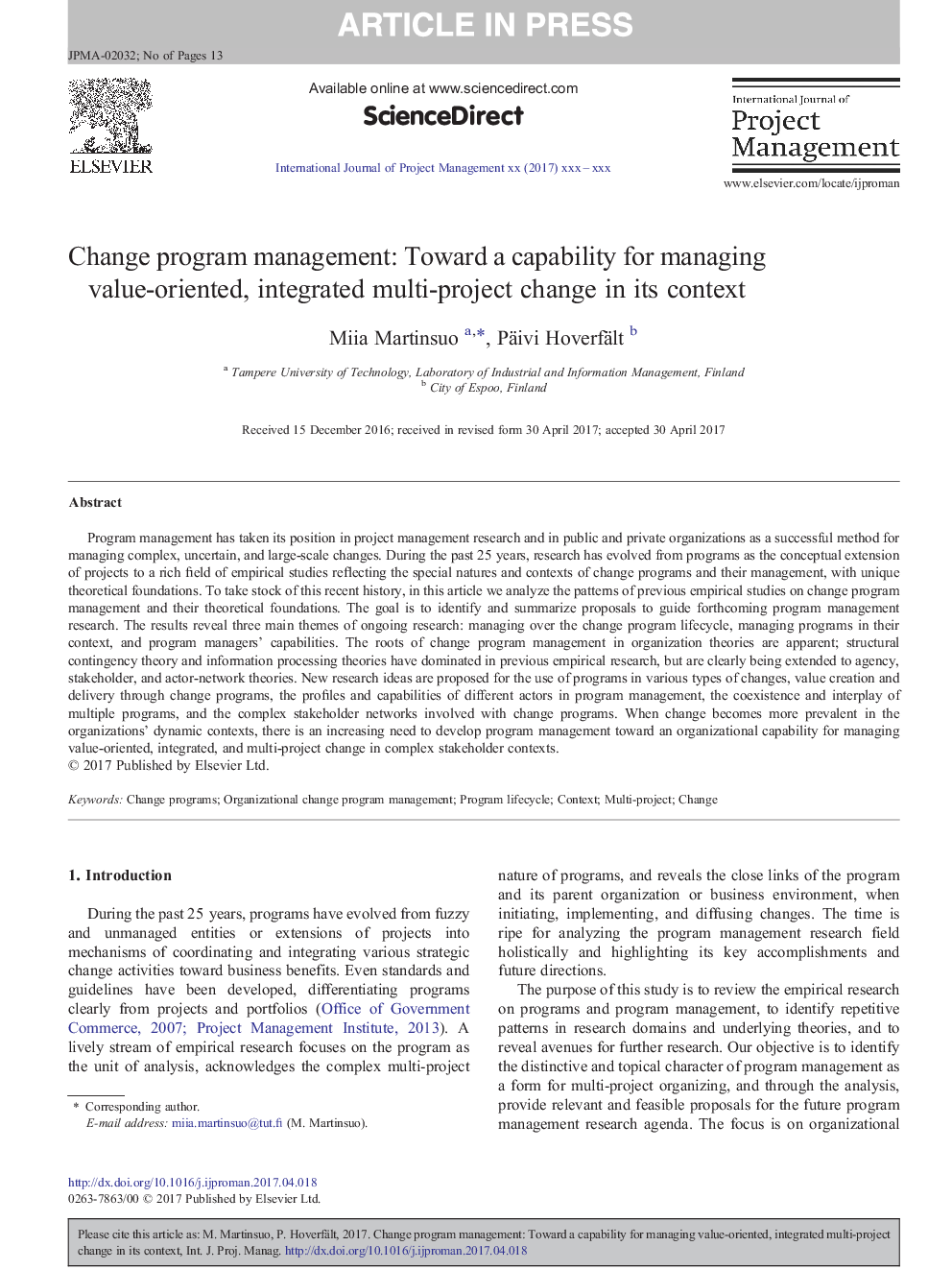| کد مقاله | کد نشریه | سال انتشار | مقاله انگلیسی | نسخه تمام متن |
|---|---|---|---|---|
| 6748090 | 1429651 | 2018 | 13 صفحه PDF | دانلود رایگان |
عنوان انگلیسی مقاله ISI
Change program management: Toward a capability for managing value-oriented, integrated multi-project change in its context
ترجمه فارسی عنوان
تغییر مدیریت برنامه: به سمت توانایی برای مدیریت ارزش گرا، تغییر چندپرداخت یکپارچه در متن آن
دانلود مقاله + سفارش ترجمه
دانلود مقاله ISI انگلیسی
رایگان برای ایرانیان
کلمات کلیدی
تغییر برنامه ها، مدیریت برنامه مدیریت تغییر، چرخه زندگی برنامه متن نوشته، چند پروژه، تغییر دادن،
ترجمه چکیده
مدیریت برنامه موقعیت خود را در تحقیقات مدیریت پروژه و در سازمان های دولتی و خصوصی به عنوان یک روش موفق برای مدیریت تغییرات پیچیده، نامشخص و در مقیاس بزرگ گرفته است. طی 25 سال گذشته، سالیان متمادی، تحقیق از برنامه ها به عنوان مفهومی توسعه پروژه ها به یک زمینه غنی از مطالعات تجربی منعکس شده از طبیعت ویژه و زمینه های برنامه های تغییر و مدیریت آنها با پایه های نظری منحصر به فرد تبدیل شده است. برای بررسی این تاریخ اخیر، در این مقاله، الگوهای مطالعات تجربی قبلی در مورد مدیریت برنامه تغییر و پایه های نظری آنها را تجزیه و تحلیل می کنیم. هدف این است که پیشنهادات و راهنمایی هایی را برای هدایت تحقیقات مدیریت برنامه آینده ارائه دهیم. نتایج نشان می دهد که سه موضوع اصلی تحقیق در حال انجام است: مدیریت چرخه حیات برنامه تغییر، مدیریت برنامه ها در بستر آنها و قابلیت های مدیران برنامه. ریشه های مدیریت تغییر برنامه در نظریه های سازمان آشکار است. تئوری احتمالی ساختاری و نظریه پردازش اطلاعات در تحقیقات تجربی پیشین تسلط یافته اند، اما به وضوح به آژانس، ذینفعان و نظریه های شبکه بازیگری گسترش می یابد. ایده های تحقیق جدید برای استفاده از برنامه ها در انواع مختلف تغییرات، ایجاد ارزش و تحویل از طریق برنامه های تغییر، نمایه ها و قابلیت های بازیگران مختلف در مدیریت برنامه، همزیستی و تعامل برنامه های چندگانه و شبکه های مشارکت کننده پیچیده درگیر با تغییر برنامه ها هنگامی که تغییر در شرایط دینامیک سازمان بیشتر شایع می شود، نیاز به افزایش نیاز به مدیریت برنامه ها به سوی یک قابلیت سازمانی برای مدیریت تغییر ارزش گرا، یکپارچه و چندین پروژه در زمینه های ذینفع پیچیده وجود دارد.
موضوعات مرتبط
مهندسی و علوم پایه
سایر رشته های مهندسی
مهندسی عمران و سازه
چکیده انگلیسی
Program management has taken its position in project management research and in public and private organizations as a successful method for managing complex, uncertain, and large-scale changes. During the past 25Â years, research has evolved from programs as the conceptual extension of projects to a rich field of empirical studies reflecting the special natures and contexts of change programs and their management, with unique theoretical foundations. To take stock of this recent history, in this article we analyze the patterns of previous empirical studies on change program management and their theoretical foundations. The goal is to identify and summarize proposals to guide forthcoming program management research. The results reveal three main themes of ongoing research: managing over the change program lifecycle, managing programs in their context, and program managers' capabilities. The roots of change program management in organization theories are apparent; structural contingency theory and information processing theories have dominated in previous empirical research, but are clearly being extended to agency, stakeholder, and actor-network theories. New research ideas are proposed for the use of programs in various types of changes, value creation and delivery through change programs, the profiles and capabilities of different actors in program management, the coexistence and interplay of multiple programs, and the complex stakeholder networks involved with change programs. When change becomes more prevalent in the organizations' dynamic contexts, there is an increasing need to develop program management toward an organizational capability for managing value-oriented, integrated, and multi-project change in complex stakeholder contexts.
ناشر
Database: Elsevier - ScienceDirect (ساینس دایرکت)
Journal: International Journal of Project Management - Volume 36, Issue 1, January 2018, Pages 134-146
Journal: International Journal of Project Management - Volume 36, Issue 1, January 2018, Pages 134-146
نویسندگان
Miia Martinsuo, Päivi Hoverfält,
